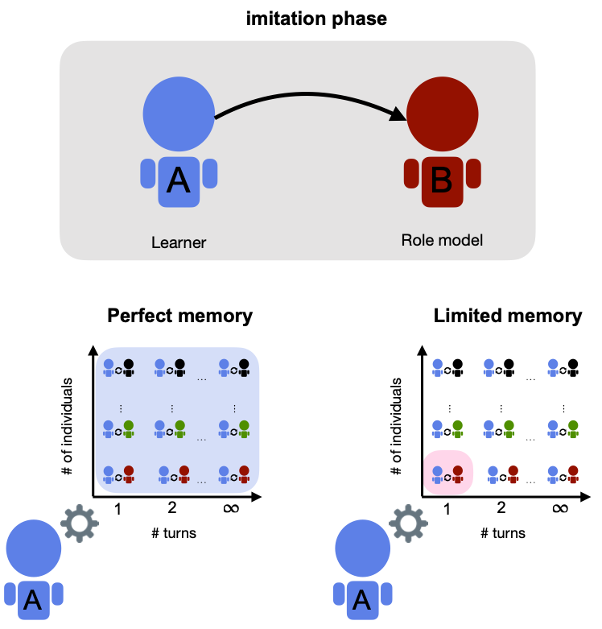Direct reciprocity facilitates cooperation in repeated social interactions. Traditional models suggest that individuals learn to adopt conditionally cooperative strategies if they have multiple encounters with their partner. However, most existing models make rather strong assumptions about how individuals decide to keep or change their strategies. They assume individuals make these decisions based on a strategy’s average performance. This in turn suggests that individuals would remember their exact payoffs against everyone else.
In our recent publication with Dr Alex McAvoy (the School of Data Science and Society, and the Department of Mathematics at the University of North Carolina at Chapel) and Dr Christian Hilbe (Max Planck Institute for Evolutionary Biology) we examine the effects of realistic memory constraints. We find that cooperation can evolve even with minimal memory capacities.
Direct reciprocity is based on repeated interactions between two individuals. This concept, often described as “you scratch my back, I’ll scratch yours”, has proven to be a pivotal mechanism in maintaining cooperation within groups or societies. While models of direct reciprocity have deepened our understanding of cooperation, they frequently make strong assumptions about individuals’ memory and decision-making processes. For example, when strategies are updated through social learning, it is commonly assumed that individuals compare their average payoffs. This would require them to compute (or remember) their payoffs against everyone else in the population. To understand how more realistic constraints influence direct reciprocity, the current study considers the evolution of conditional behaviors when individuals learn based on more recent experiences.
Two extreme scenarios. This study first compares the classical modeling approach with another extreme approach. In the classical approach, individuals update their strategies based on their expected payoffs, considering every single interaction with each member of the population (perfect memory). Conversely, the opposite extreme is considering only the very last interaction (limited memory). Comparing these two scenarios shows that individuals with limited payoff memory tend to adopt less generous strategies. They are less forgiving when someone defects against them. Yet, moderate levels of cooperation can still evolve.

Intermediate cases. We also consider intermediate cases, where individuals consider their last two or three or four recent experiences. The results show that cooperation rates quickly approach the levels observed under perfect payoff memory.
Overall, our study contributes to a wider literature that explores which kinds of cognitive capacities are required for reciprocal altruism to be feasible. While more memory is always favorable, reciprocal cooperation can already be sustained if individuals have a record of two or three past outcomes.